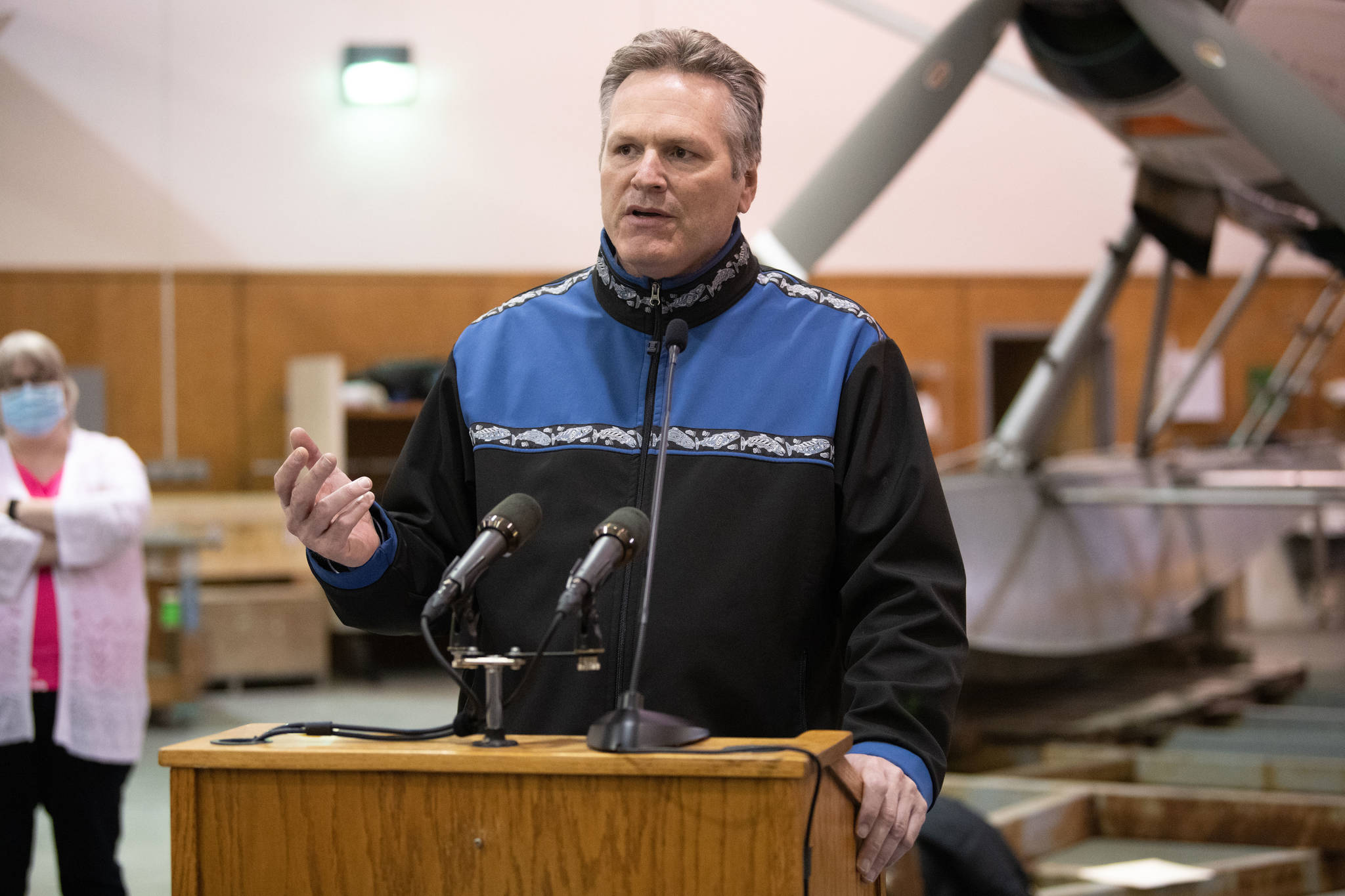Alaska will offer free COVID-19 vaccines to people flying into the state at four major airports starting June 1, Gov. Mike Dunleavy announced during a press conference on Friday.
The free vaccines are part of the state’s efforts to increase tourism amid concerns about a second lost cruise ship season. The announcement comes amid plateauing COVID-19 vaccination rates statewide.
During the conference, Dunleavy praised the efforts of the state’s Native health groups, including the Alaska Native Tribal Health Consortium, administering vaccines, which he said is a key reason vaccination rates are so high. However, he also noted that data suggest demand for vaccines in Alaska is “leveling off.”
“The idea is if we have excess vaccines, why not use them?” Dunleavy said. “So what we’re saying to our tourists [is] if you come to Alaska … you get a free vaccination if you want one.”
Alaska Director of Public Health Heidi Hedberg said mobile vaccine clinics offering the Pfizer and Moderna vaccines will be located at Ted Stevens Anchorage International Airport, Fairbanks International Airport, Ketchikan International Airport and Juneau International Airport. Vaccine availability nationwide, Hedberg said, suggests people should not have difficulty getting their second dose if they leave Alaska before it is time for their second dose.
Dunleavy first teased the tourism initiative during a separate press conference in Juneau, where he introduced other steps Alaska will take to help mitigate a potential loss in seasonal tourism. Those included the launch of a nationwide marketing campaign encouraging tourism in Alaska and grant opportunities for tourism businesses. Dunleavy also signed Senate Joint Resolution 9, which asks the federal government to exempt cruise ships from the Passenger Vessel Services Act while Canadian ports are closed to cruise ships carrying more than 100 people, and said the state would be prepared to take legal action against the U.S. Centers for Disease Control and Prevention if the agency doesn’t lift its conditional sailing order.
Following news of Canada’s implementation of a restriction that bans cruise ships with more than 100 people from sailing through Canadian waters until February 2022, the state has worked to offset the threat posed to its upcoming tourism season. Federal law requires certain passenger boats sailing from ports in the United States to visit a foreign port before returning to a port in the U.S.
Dunleavy said Friday that he wants the CDC to let his administration work with the cruise ship industry to prevent the loss of another tourism season and that Alaska is prepared to take legal action similar to that being pursued by Florida. Florida Gov. Rick DeSantis announced last week that Florida will sue the federal government and the CDC in an attempt to “immediately” bring back cruise ships to the state.
“We’re fully prepared to file suit to talk about damages to our state, to our businesses [and] to our municipalities,” Dunleavy said. “I know Florida has embarked upon this and we’ll be in conversation — quite frankly we may sign up with them and file our own suit if necessary. We’re not doing this as a threat. We want to work with the federal government, but if that’s the only tool that’s going to be left in our toolbox, we’re prepared to pursue that.”
According to S.J.R. 9, more than 2.26 million people traveled to Alaska in 2019, including more than 1.3 million who visited via cruise ship and accounted for more than 90% of visitors in the Southeast. In municipal and state revenue, tourism brings in more than $214 million each year, while more than $1.4 billion is generated in payroll and $2.2 billion is generated in visitor spending.
Dunleavy’s tourism initiative is one element of his proposal for distribution of funds the state will receive through the American Rescue Plan, which was signed into law last month. More than 240 pages long, the ARP is one of the largest economic stimulus bills in U.S. history, comparable only to the CARES Act, which passed in 2020.
Alaska received just over $1 billion in funding via the ARP for discretionary COVID-19 recovery efforts, in addition to $518 million in non-discretionary funds. Dunleavy said during Friday’s press conference that he wants to use $325 million for economic recovery, $325 million for infrastructure investment, $150 million for tourism revitalization, $139.26 for offsetting existing general fund expenditures and $80 million for aid to Alaskans.
According to a press release from Dunleavy’s office on Friday, legislation outlining the proposed distribution of ARP plans will be formally introduced on Monday.
Dunleavy’s full press conference can be viewed on his Facebook page.
Reach reporter Ashlyn O’Hara at ashlyn.ohara@peninsulaclarion.com.
This story has been updated to correct the spelling of Alaska Director of Public Health Heidi Hedberg’s name.

